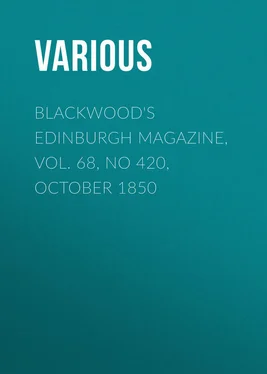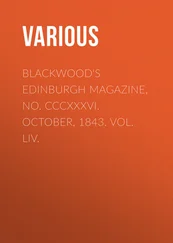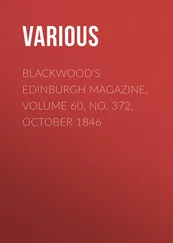Various - Blackwood's Edinburgh Magazine, Vol. 68, No 420, October 1850
Здесь есть возможность читать онлайн «Various - Blackwood's Edinburgh Magazine, Vol. 68, No 420, October 1850» — ознакомительный отрывок электронной книги совершенно бесплатно, а после прочтения отрывка купить полную версию. В некоторых случаях можно слушать аудио, скачать через торрент в формате fb2 и присутствует краткое содержание. Издательство: Иностранный паблик, Жанр: periodic, foreign_edu, Путешествия и география, на английском языке. Описание произведения, (предисловие) а так же отзывы посетителей доступны на портале библиотеки ЛибКат.
- Название:Blackwood's Edinburgh Magazine, Vol. 68, No 420, October 1850
- Автор:
- Издательство:Иностранный паблик
- Жанр:
- Год:неизвестен
- ISBN:нет данных
- Рейтинг книги:4 / 5. Голосов: 1
-
Избранное:Добавить в избранное
- Отзывы:
-
Ваша оценка:
- 80
- 1
- 2
- 3
- 4
- 5
Blackwood's Edinburgh Magazine, Vol. 68, No 420, October 1850: краткое содержание, описание и аннотация
Предлагаем к чтению аннотацию, описание, краткое содержание или предисловие (зависит от того, что написал сам автор книги «Blackwood's Edinburgh Magazine, Vol. 68, No 420, October 1850»). Если вы не нашли необходимую информацию о книге — напишите в комментариях, мы постараемся отыскать её.
Blackwood's Edinburgh Magazine, Vol. 68, No 420, October 1850 — читать онлайн ознакомительный отрывок
Ниже представлен текст книги, разбитый по страницам. Система сохранения места последней прочитанной страницы, позволяет с удобством читать онлайн бесплатно книгу «Blackwood's Edinburgh Magazine, Vol. 68, No 420, October 1850», без необходимости каждый раз заново искать на чём Вы остановились. Поставьте закладку, и сможете в любой момент перейти на страницу, на которой закончили чтение.
Интервал:
Закладка:
"They could not have raised these men with a view to relieve the prisoners at the Westgate, because at the time they collected on the mountain they had not been taken. But had it any relation to Vincent? What is their intention? We have been told again and again that Mr Frost must not be supposed likely to do absurd things; that he is a man of the world and a man of intelligence. What then, gentlemen, do you think of an attempt to induce the Monmouthshire magistrates to relax the prison discipline in favour of a person who has been convicted of sedition, or seditious libel, or something of that sort, by marching into Newport with ten thousand men armed? What do you think of a man of the world resorting to that mode of inducing the magistrates to relax in favour of a prisoner? Is Mr Frost a man of intelligence? Is he a man of the world? Suppose he had been the worst foe that Vincent ever had, suppose that he had desired to procure additional restrictions to be put upon him, and had wished that he should sustain the last hour of the sentence which had been pronounced upon him, could he have resorted to a more maliciously effective mode than by showing that those who were connected with Vincent were persons so little acquainted with their duty, so little obedient to the law, so little to be depended upon for their peaceable conduct, as that they would march at that hour of the night into a town, alarming and frightening every body?" – (I. p. 79.)
Again: —
"Gentlemen, will you judge of the criminal intentions of persons engaged in an insurrection by the probability of their success? If you do, you will judge of a mob by a rule that never was found correct yet. They always imagine – and they would not begin if they did not imagine, though they always imagine wrong, but they never will learn wisdom – they always imagine that they can accomplish more than they can; of course they begin, not with the idea of fastening a halter round their necks, but with the idea that they shall succeed, and by their success escape. With those thousands of men (you will see as I pass on what the number of the soldiers were,) was it an unnatural thing that, coming at between one and two o'clock in the morning, they should surprise the poor-house; that the soldiers, not being aware that they were coming, might not be prepared – might be taken by surprise – might be either overcome or murdered before they could put themselves in a condition to defend themselves?
"Are their sayings inconsistent? What conspiracy ever was consistent? You would indeed give the most perfect freedom to conspiracy, rebellion, and treason, if you disbelieved witnesses coming to prove declarations inconsistent if made at the same time, though not inconsistent when made at different times. They may at first think the soldiers to be Chartists and their friends, and, in the next moment, talk of attacking them in their barracks. But will you give a carte blanche to conspirators and traitors by saying, that if witnesses prove inconsistent declarations, they are not to be believed? It is not, gentlemen, the inconsistency of the witnesses, but of those engaged in transactions, the conduct and management of which must vary from hour to hour according as circumstances arise; and that which a man may contemplate one minute, may the following minute or the next hour be inconsistent with the views that had prevailed arising out of the then existing circumstances." – (I. p. 89.)
The circumstance of Frost's having been found with the loaded pistols, and not having attempted to use them, is thus significantly disposed of: —
"Give him the benefit of the circumstance that he did not use the three loaded pistols which he had about him. But I think, unfortunately, that they speak much more strongly as indicating violent intentions when those pistols were provided , than they speak peaceable intentions when he was apprehended." – (I. p. 24.)
There has been no counsel at the English bar, in modern times, whose reply was more dreaded by an opponent than Sir Thomas Wilde; and that reply, in Frost's case, abundantly shows how well founded was that apprehension.
Thus, then, the counsel on both sides having played out their parts in the case, it stood awaiting the intervention of the Lord Chief-Justice – the very model of judicial excellence. Tranquil, grave, patient; exact, ready, profound in legal knowledge, and of perfect impartiality – all these high qualities and qualifications were exhibited by him in his luminous and masterly summing-up on this occasion. In order to give all due weight to the sole substantial suggestion offered on behalf of the prisoner — i. e. , that his object had been the liberation of Vincent – the Lord Chief-Justice read to the jury the following important passage from that great authority, Sir Matthew Hale – "If men levy war to break prisons, to deliver one or more particular persons out of prison, this was ruled, on advice of the judges, to be not high treason, but only a great riot; but if it was to break prisons, or deliver persons generally out of prison, this is treason." 12 12 Hall's Pleas of the Crown, part I., c. 14.
Having taken at once a minute and comprehensive view of the evidence, he left the following as the exact question for their determination, – "Whether it was Frost's object, by the terror which bodies of armed men would inspire, to seize and keep possession of the town of Newport, making this a beginning of an extensive rebellion, which would be high treason ; or whether he had no more in view than to effect, by the display of physical force, the amelioration of the condition of Vincent and his companions in Monmouth jail, if not their liberation, which would be a dangerous misdemeanour only ; and the jury were to look at the evidence with all possible candour and fairness, and see if the Crown had conclusively disproved this limited object and design." 13 13 Townsend, p. 95.
We conceive that neither Frost nor any one of his ten thousand dupes, on that "day of dupes" which led to this inquiry, could have taken objection to this mode of submitting the all-critical question to his jury – a jury of his peers, with the selection of whom he himself had had as much concern as the Crown.
That jury retired from court for half-an-hour, and then returned, amidst the solemn excited silence of the court – crowded to suffocation – with the fatal verdict, "Guilty;" adding, "My lords, we wish to recommend the prisoner to the merciful consideration of the court." Sentence was not immediately passed upon him. He was removed from court; and on its re-assembling on the ensuing morning, Zephaniah Williams was placed at the bar, tried, and in due course found guilty; on which William Jones was in like manner arraigned, tried, and found guilty; each being recommended by the jury to mercy. Scared by this result, five of the ringleaders resolved to throw themselves on the mercy of the Crown, withdrawing their pleas of not guilty, and pleading guilty – it having been intimated that the sentence of death should be commuted into transportation for life. The Attorney-General thought it expedient, in the case of the remaining four prisoners, who were less deeply implicated, to allow a verdict of not guilty to be recorded.
On the 16th January, Frost, Williams, and Jones were brought up to the bar to receive sentence of death, which the Lord Chief-Justice prefaced by a very solemn address, listened to in breathless silence. An imposing scene of judicial solemnity and terror, indeed, the court at that agitating moment exhibited. Without were strong detachments of soldiery, foot and horse, guarding the public peace: within were an anxious auditory, commanded to keep silence under pain of fine and imprisonment, while sentence of death was being passed upon the prisoners. There were, in the midst of the throng, two groups awfully contrasted in character and position – the three prisoners, standing pale and subdued; and, sitting opposite, the three judges, each wearing his black cap; while the following heart-sickening words fell from the lips of the Lord Chief-Justice: —
Читать дальшеИнтервал:
Закладка:
Похожие книги на «Blackwood's Edinburgh Magazine, Vol. 68, No 420, October 1850»
Представляем Вашему вниманию похожие книги на «Blackwood's Edinburgh Magazine, Vol. 68, No 420, October 1850» списком для выбора. Мы отобрали схожую по названию и смыслу литературу в надежде предоставить читателям больше вариантов отыскать новые, интересные, ещё непрочитанные произведения.
Обсуждение, отзывы о книге «Blackwood's Edinburgh Magazine, Vol. 68, No 420, October 1850» и просто собственные мнения читателей. Оставьте ваши комментарии, напишите, что Вы думаете о произведении, его смысле или главных героях. Укажите что конкретно понравилось, а что нет, и почему Вы так считаете.












